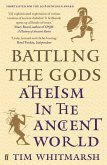For many of us, the issue of whether or not God exists is among the most perplexing and profound questions of our lives. Laura Ekstrom examines this issue in light of ubiquitous human suffering. When we survey the world, we observe an enormous amount of pain, including virtually unspeakable kinds of maltreatment and agony, many instances of which seem patently to be unfair, unearned, and pointless. In light of these observations, this book argues that it is reasonable to conclude that God does not exist. Ekstrom shows the power of arguments from evil for atheism, while giving a thorough critical examination of attempts to answer them.
Hinweis: Dieser Artikel kann nur an eine deutsche Lieferadresse ausgeliefert werden.
Hinweis: Dieser Artikel kann nur an eine deutsche Lieferadresse ausgeliefert werden.








